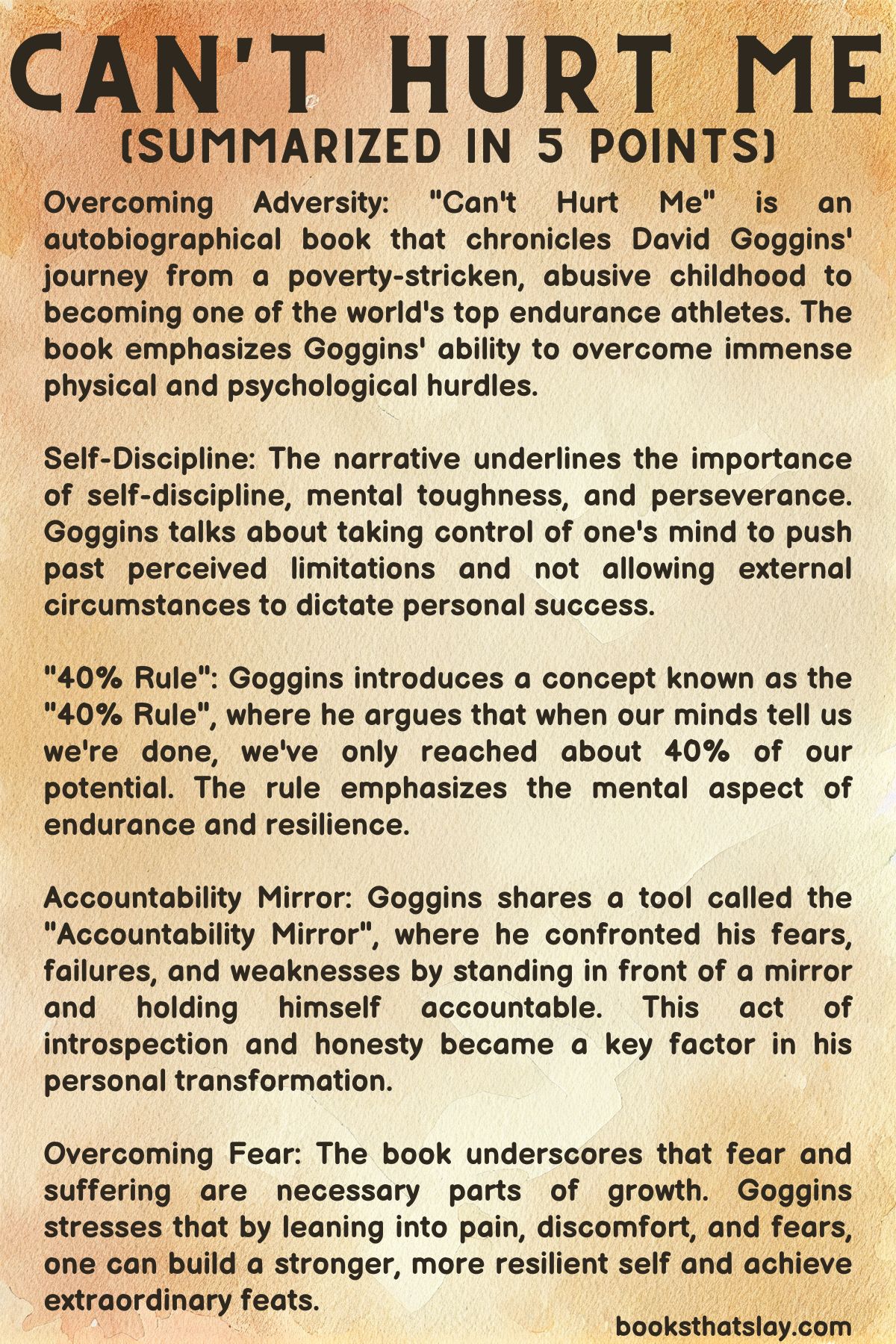Can’t Hurt Me | Book Summary | David Goggins
“Cant Hurt Me” by David Goggins is a powerful autobiography that goes beyond the typical self-help book. It is a raw, emotional, and gripping account of the author’s journey from poverty, prejudice, and physical abuse to becoming one of the world’s top endurance athletes and military icons.
Published in 2018, the book details Goggins’ personal philosophy of self-discipline, mental toughness, hard work, and the relentless pursuit of one’s full potential.
Can’t Hurt Me Summary
Goggins was born into an abusive household, which cultivated his initial struggles with poverty and learning disabilities. Despite these early hardships, Goggins aspired to become a Navy SEAL, one of the most elite military groups in the United States.
The book begins with Goggins’ troubled childhood, where he faced abuse from his father, racial prejudice in his Indiana neighborhood, and was diagnosed with a learning disorder. His weight also ballooned due to stress eating.
Despite these struggles, he developed a fierce determination to overcome adversity.
After high school, Goggins initially joined the Air Force in an attempt to escape his circumstances but failed to become a pararescue airman due to health issues. He then found himself working as an exterminator and weighing almost 300 pounds, which was a stark contrast from the dreams of his youth.
The turning point came when he watched a documentary about Navy SEALs, elite warriors who are known for their physical and mental endurance.
Inspired, Goggins decided to pursue a career as a SEAL, but first, he had to overcome a significant obstacle – his weight. In less than three months, he lost over 100 pounds and successfully completed the SEAL training, becoming one of the few African American Navy SEALs.
The book isn’t just about his Navy SEAL experience. Goggins later became a world-class endurance athlete, competing in and often winning extreme events such as the Ultraman World Championships and the Badwater 135 ultramarathon.
He even set a world record for the most pull-ups done in 24 hours. Through these experiences, Goggins shares the mental and physical principles that led to his transformation and success.
One of the key themes in the book is the “40% Rule,” which is based on Goggins’ belief that when our minds tell us we’re done, we’re really only 40% done.
He demonstrates how we can push past the perceived limits of our capabilities and achieve what we might have thought was impossible.
The book concludes with a series of challenges for the reader. These are not simple “think positive” challenges but require real effort and determination, encouraging readers to step out of their comfort zones and confront their own limitations head-on, just as Goggins did.

Also Read: Silent Spring by Rachel Carson
What can you learn from the book?
1. The Power of Self-Discipline and Perseverance
David Goggins’ life journey—from his abusive childhood and struggle with obesity to becoming a NAVY SEAL and an ultra-marathon runner—illustrates that perseverance and discipline can lead to extraordinary results.
For instance, Goggins had to lose over a hundred pounds in less than three months to qualify for SEAL training, which he achieved through rigorous self-discipline and relentless determination.
This lesson is applicable to all areas of life, including personal goals, academic achievements, and professional endeavors.
Perseverance, coupled with discipline, can help overcome almost any hurdle, no matter how daunting it may seem.
2. Embrace Discomfort to Grow
Goggins introduces a concept he calls “callusing the mind,” inspired by his experiences in the grueling BUD/S training.
Just as our hands develop calluses from repeated friction and pressure, our minds can become resilient in the face of adversity through consistent exposure to discomfort.
By continually pushing his physical and mental boundaries—for example, by running in extreme conditions or engaging in exhaustive workout routines—Goggins demonstrated that it’s through discomfort that we truly grow and evolve.
This principle can be applied in our daily lives by challenging ourselves beyond our comfort zones, be it tackling a difficult project at work or engaging in challenging physical activities.
Also Read: Untamed by Glennon Doyle | Book Summary
3. The Importance of the Accountability Mirror
Goggins stresses the importance of accountability and self-honesty in achieving one’s goals.
He uses the term “Accountability Mirror“ referring to the act of honestly assessing oneself in the mirror.
He used this technique to confront his own shortcomings, such as his poor physical health and lack of education, writing his goals on sticky notes and attaching them to the mirror.
By confronting his realities and holding himself accountable for his own progress, he was able to turn his life around drastically.
This lesson can be applied by acknowledging our own weaknesses and taking personal responsibility for improving and moving forward.
4. The 40% Rule – Tapping into Our Unutilized Potential
Goggins advocates the “40% Rule,” a notion that when our minds tell us we’re done, we’re only actually 40% done, and there’s still 60% more that we can give.
He demonstrated this principle in various instances in his life, such as during his multiple hell-week experiences and ultra-endurance races.
Despite the excruciating pain and mental fatigue, he continually pushed himself past his perceived limits, thus redefining what he thought was possible.
By adopting the 40% rule, we can tap into our unutilized potential, not just in physical endeavors but in intellectual and creative pursuits as well.
Final Thoughts
“Can’t Hurt Me” is an inspiring autobiography that challenges us to push past our perceived limits and unleash our untapped potential. It’s a testament to the power of self-discipline, mental toughness, and an indomitable spirit.
Also Read: